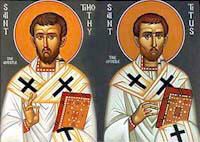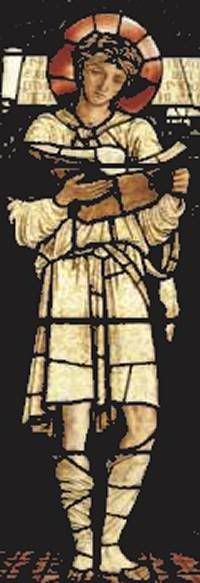Today, January 26, we celebrate the feast of Saints Timothy and Titus—close friends and collaborators of Saint Paul. For details of their live, visit last year’s post on these holy men here.
Below, the General Audience of Pope Benedict XVI (2006), in which the Holy Father reminds us that Timothy and Titus demonstrate that we too can be rich in good deeds and thus open the doors of the world to Jesus
Dear Brothers and Sisters,
Having spoken at length on the great Apostle Paul, today let us look at his two closest collaborators: Timothy and Titus. Three Letters traditionally attributed to Paul are addressed to them, two to Timothy and one to Titus.
Timothy is a Greek name which means "one who honours God". Whereas Luke mentions him six times in the Acts, Paul in his Letters refers to him at least 17 times (and his name occurs once in the Letter to the Hebrews).
One may deduce from this that Paul held him in high esteem, even if Luke did not consider it worth telling us all about him.
Indeed, the Apostle entrusted Timothy with important missions and saw him almost as an alter ego, as is evident from his great praise of him in his Letter to the Philippians. "I have no one like him (isópsychon) who will be genuinely anxious for your welfare" (2:20).
Timothy was born at Lystra (about 200 kilometres northwest of Tarsus) of a Jewish mother and a Gentile father (cf. Acts 16:1).
The fact that his mother had contracted a mixed-marriage and did not have her son circumcised suggests that Timothy grew up in a family that was not strictly observant, although it was said that he was acquainted with the Scriptures from childhood (cf. II Tm 3:15). The name of his mother, Eunice, has been handed down to us, as well as that of his grandmother, Lois (cf. II Tm 1:5).
Chosen for his good reputation
When Paul was passing through Lystra at the beginning of his second missionary journey, he chose Timothy to be his companion because "he was well spoken of by the brethren at Lystra and Iconium" (Acts 16:2), but he had him circumcised "because of the Jews that were in those places" (Acts 16:3).
Together with Paul and Silas, Timothy crossed Asia Minor as far as Troy, from where he entered Macedonia. We are informed further that at Philippi, where Paul and Silas were falsely accused of disturbing public order and thrown into prison for having exposed the exploitation of a young girl who was a soothsayer by several unscrupulous individuals (cf. Acts 16:16-40), Timothy was spared.
When Paul was then obliged to proceed to Athens, Timothy joined him in that city and from it was sent out to the young Church of Thessalonica to obtain news about her and to strengthen her in the faith (cf. I Thes 3:1-2). He then met up with the Apostle in Corinth, bringing him good news about the Thessalonians and working with him to evangelize that city (cf. II Cor 1:19).
We find Timothy at Ephesus during Paul's third missionary journey. It was probably from there that the Apostle wrote to Philemon and to the Philippians; he sent both Letters jointly with Timothy (cf. Phlm 1; Phil 1:1).
From Ephesus, Paul sent Timothy to Macedonia, together with a certain Erastus (cf. Acts 19:22), and then also to Corinth with the mission of taking a letter to the Corinthians, in which he recommended that they welcome him warmly (cf. I Cor 4:17; 16:10-11).
We encounter him again as the joint sender of the Second Letter to the Corinthians, and when Paul wrote the Letter to the Romans from Corinth he added Timothy's greetings as well as the greetings of the others (cf. Rom 16:21).
From Corinth, the disciple left for Troy on the Asian coast of the Aegean See and there awaited the Apostle who was bound for Jerusalem at the end of his third missionary journey (cf. Acts 20:4).
From that moment in Timothy's biography, the ancient sources mention nothing further to us, except for a reference in the Letter to the Hebrews which says: "You should understand that our brother Timothy has been released, with whom I shall see you if he comes soon" (13:23).
To conclude, we can say that the figure of Timothy stands out as a very important pastor. According to the later Storia Ecclesiastica by Eusebius, Timothy was the first Bishop of Ephesus (cf. 3, 4). Some of his relics, brought from Constantinople, were found in Italy in 1239 in the Cathedral of Termoli in the Molise.
Believed to be Bishop of Crete
Then, as regards the figure of Titus, whose name is of Latin origin, we know that he was Greek by birth, that is, a pagan (cf. Gal 2:3). Paul took Titus with him to Jerusalem for the so-called Apostolic Council, where the preaching of the Gospel to the Gentiles that freed them from the constraints of Mosaic Law was solemnly accepted.
In the Letter addressed to Titus, the Apostle praised him and described him as his "true child in a common faith" (Ti 1:4). After Timothy's departure from Corinth, Paul sent Titus there with the task of bringing that unmanageable community to obedience.
Titus restored peace between the Church of Corinth and the Apostle, who wrote to this Church in these terms: "But God, who comforts the downcast, comforted us by the coming of Titus, and not only by his coming but also by the comfort with which he was comforted in you, as he told us of your longing, your mourning, your zeal for me.... And besides our own comfort we rejoiced still more at the joy of Titus, because his mind has been set at rest by you all" (II Cor 7:6-7, 13).
From Corinth, Titus was again sent out by Paul — who called him "my partner and fellow worker in your service" (II Cor 8:23) — to organize the final collections for the Christians of Jerusalem (cf. II Cor 8:6).
Further information from the Pastoral Letters describes him as Bishop of Crete (cf. Ti 1:5), from which, at Paul's invitation, he joined the Apostle at Nicopolis in Epirus (cf. Ti 3:12). Later, he also went to Dalmatia (cf. II Tm 4:10). We lack any further information on the subsequent movements of Titus or on his death.
St. Paul relied on collaborators
To conclude, if we consider together the two figures of Timothy and Titus, we are aware of certain very significant facts. The most important one is that in carrying out his missions. Paul availed himself of collaborators. He certainly remains the Apostle par excellence, founder and pastor of many Churches.
Yet it clearly appears that he did not do everything on his own but relied on trustworthy people who shared in his endeavours and responsibilities.
Another observation concerns the willingness of these collaborators. The sources concerning Timothy and Titus highlight their readiness to take on various offices that also often consisted in representing Paul in circumstances far from easy. In a word, they teach us to serve the Gospel with generosity, realizing that this also entails a service to the Church herself.
Lastly, let us follow the recommendation that the Apostle Paul makes to Titus in the Letter addressed to him: "I desire you to insist on these things, so that those who have believed in God may be careful to apply themselves to good deeds; these are excellent and profitable men" (Ti 3:8).
Through our commitment in practice we can and must discover the truth of these words, and precisely in this Season of Advent, we too can be rich in good deeds and thus open the doors of the world to Christ, our Saviour.
Almighty God, you called Timothy and Titus to be evangelists and teachers, and made them strong to endure hardship: Strengthen us to stand fast in adversity, and to live godly and righteous lives in this present time, that with sure confidence we may look for our blessed hope, the glorious appearing of our great God and Savior Jesus Christ; who lives and reigns with you and the Holy Spirit, one God, now and for ever. Amen.
Why pray the Rosary every day for a year?
Each time the Blessed Virgin has appeared-- whether it be to Saint Bernadette Soubirous at Lourdes; to Lucia, Jacinta, and Francisco at Fatima; or to Mariette Beco at Banneux-- she has asserted the importance, saving grace, and power of praying the Holy Rosary on a daily basis. Based upon her words, the Rosary is penance and conversion for sinners, a pathway to peace, an end to war, and a powerful act of faith in Jesus Christ. Pope Paul VI presented the Rosary as a powerful means to reach Christ "not merely with Mary but indeed, insofar as this is possible to us, in the same way as Mary, who is certainly the one who thought about Him more than anyone else has ever done."
To show us how this is done, perhaps no one has been more eloquent than the great Cardinal Newman, who wrote: "The great power of the Rosary consists in the fact that it translates the Creed into Prayer. Of course, the Creed is already in a certain sense a prayer and a great act of homage towards God, but the Rosary brings us to meditate again on the great truth of His life and death, and brings this truth close to our hearts. Even Christians, although they know God, usually fear rather than love Him. The strength of the Rosary lies in the particular manner in which it considers these mysteries, since all our thinking about Christ is intertwined with the thought of His Mother, in the relations between Mother and Son; the Holy Family is presented to us, the home in which God lived His infinite love."
As Mary said at Fatima, "Jesus wants to use you to make Me known and loved. He wishes to establish the devotion to My Immaculate Heart throughout the world. I promise salvation to whoever embraces it; these souls will be dear to God, like flowers put by Me to adorn his throne."

Subscribe to:
Post Comments (Atom)
















0 comments:
Post a Comment
Thanks for leaving a comment. If you wish to submit a prayer request, however, please do so above, using the "Contact" tab.